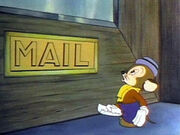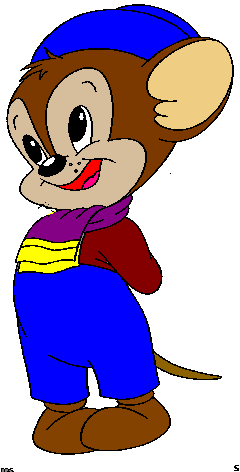Sniffles is an animated cartoon and comic-book character in the Warner Bros. Merrie Melodies series of cartoons and comics.
Character biography[]

Sniffles the mouse, in his debut short, Naughty But Mice.
Animator Chuck Jones created Sniffles as a potential new star for the studio in 1939. The character was designed by Disney veteran Charles Thorson, an old hand at designing cute characters for Disney's Silly Symphonies. Thorson's design was highly derivative of a character he had designed for Disney in 1936, the country mouse from the Oscar-winning short The Country Cousin. Both the country mouse and Sniffles are, in a word, cute. Sniffles' head is almost as large as his body, which allows his infant-like face to dominate his look. He has large, baby-like eyes, a small bewhiskered nose, and a perpetual smile. His ears grow from the sides of his head, placed so as to hearken more to a human infant than to Disney's top star, Mickey Mouse. The character wears a blue sailor cap, a red shirt, blue pants, a yellow scarf, and tan shoes. His fur is brown with light markings on the face.
Jones debuted the character in the 1939 short Naughty But Mice (which is quite similar to Disney's "The Country Cousin" itself) though he has nearly identical traits to the hero kitten in the 1938 short The Night Watchman. In Naughty but Mice, Sniffles has a cold and is searching for a remedy. He eventually stumbles upon an alcoholic cold medicine, drinks it, and becomes intoxicated. He then pals around with an electric shaver, which eventually saves him from a hungry cat. Sniffles was played by voice actresses Gay Seabrook,[1] Bernice Hansen,[2] and Sara Berner.[1]
Jones went on to direct 10 more cartoons featuring Sniffles, most of which showcase the naïveté of Sniffles by placing him in a dangerous world. For example, in Sniffles Takes a Trip, a simple drive into the country turns into a nightmare as Sniffles is constantly frightened and awed by his surroundings. Some of Sniffles' films pair him with a bookworm character who accompanies the mouse into a sort of fantasyland where books and toys come to life, such as Toy Trouble. Others simply focus on the inescapable sweetness of the character.
In Bedtime for Sniffles, for example, he struggles to stay awake into the wee hours on Christmas Eve in order to glimpse Santa Claus (which of course never happens). This scene is a showcase for Jones' facility of realizing character through facial expression.
By the end of the series, Jones transformed Sniffles into an incessant chatterbox who serves more as a nuisance than a cute protagonist. For example, in The Unbearable Bear, Sniffles foils a robbery attempt by perpetually pestering the perpetrator. Jones was moving out of his Disney-esque stage in the late 1945, and Sniffles was retired in 1946 as the director took to more hilarious and sadistic characters such as the Three Bears, fellow mice Hubie and Bertie, Marvin The Martian, and Wile E. Coyote and Road Runner. The mouse's final cartoon was Hush My Mouse (his only entry in the Looney Tunes series) in 1946.
Sniffles quickly faded into obscurity in the animation arena. However, he would find new life in the Looney Tunes and Merrie Melodies Comics begun in 1940 by Dell Comics (writer Chase Craig used several minor Warner Bros. characters to fill pages). These comics teamed Sniffles with a little girl named Mary Jane who could shrink herself to mouse size by sprinkling magic sand or simply by wishing it. Sniffles and Mary Jane would then adventure in a sort of magical toyland. Mary Jane soon surpassed the mouse in popularity, and she got top billing in later issues. Artist Roger Armstrong drew the series until Al Hubbard took over in the 1950s. These adventures proved a favorite with readers, and the series continued until 1961. This series was recently resurrected for a story in issue #140 of the current Looney Tunes comic book published by DC Comics.
With the exception of Naughty But Mice, every cartoon in the Sniffles series was given a Blue Ribbon reissue. Also, all Sniffles cartoons would end up being sold to Associated Artists Productions (a.a.p.) in 1956 (which itself would eventually be bought out by Warner Bros.).
Legacy[]
The 1990 television series Tiny Toon Adventures features a younger counterpart to Sniffles named Li'l Sneezer, a baby mouse with a propensity for achooing hurricane-force sneezes, whose mentor and favorite teacher was the Sniffles himself. Sniffles also has cameos in the movie Space Jam and the television series The Sylvester and Tweety Mysteries.
